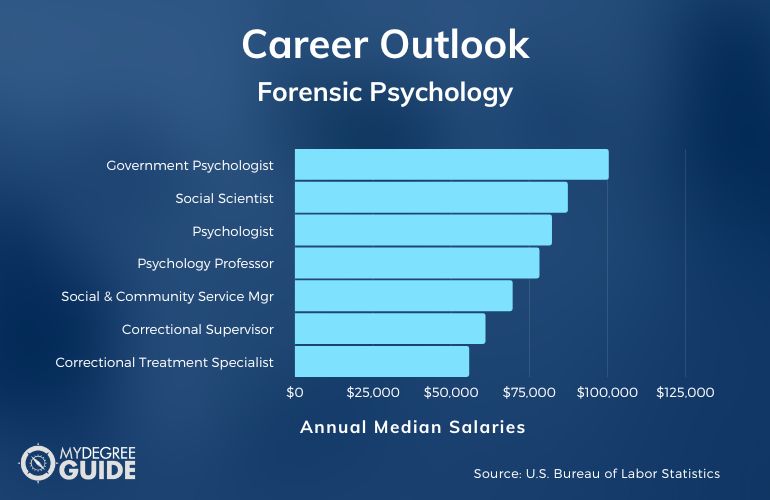Earning a masters in forensic psychology online may be a good fit for you if you’re fascinated by the relationship between law, crime, and psychology.

Studying forensic psychology at a graduate level may open a number of career opportunities in several fields, including law enforcement, counseling, social work, and research.
Editorial Listing ShortCode:
Positions in the field of forensic psychology boast an above-average annual salary, and many career paths are expected to experience growth over the coming decade.
Universities Offering Online Master’s in Forensic Psychology Degree Programs
Methodology: The following school list is in alphabetical order. To be included, a college or university must be regionally accredited and offer degree programs in psychology online or in a hybrid format.
Arizona State University
Students in Arizona State University’s Master of Science in Forensic Psychology program will take 11 classes that last about 7 and a half weeks apiece. Although this program won’t lead to licensure after completion, it’s a good program for students interested in pursuing careers in criminal justice or mental health.
Arizona State University is accredited by The Higher Learning Commission.
Capella University
The Master of Science in Clinical Psychology program at Capella University includes five core courses and six specialization-specific courses.
Students can transfer up to 15 credits into the program. Courses include introduction to psychopathology, tests and measurements, theories of counseling and psychotherapy, psychology and the law, and survey of research methods.
Capella University is accredited by the Higher Learning Commission.
Florida International University
Florida International University’s forensic science masters program is an interdisciplinary program that seeks to teach students everything they need to know to succeed in careers in local, state, and national forensic science laboratories. The curriculum is also designed to meet the requirements of the DNA Advisory Board for DNA analysts.
Florida International University is accredited by the Southern Association of Colleges and Schools Commission on Colleges.
Grand Canyon University
At Grand Canyon University, the Master of Science in Pathology with a concentration in Forensic Pathology can be undertaken entirely online.
The 36 credit program teaches students about theories of criminal behavior, social and cultural psychology, psychopathology of crime, offender rehabilitation and reintegration, and psychology of the legal system.
Grand Canyon University is accredited by the Higher Learning Commission.
Liberty University
Liberty University has a Master of Science in Criminal Justice with a concentration in Forensic Psychology program. Up to half of the 36 required credits can be transferred into the program, and the entire degree can be earned online. Some students may be eligible for 25% tuition reduction.
Liberty University is accredited by the Southern Association of Colleges and Schools Commission on Colleges.
Monroe College
Monroe College offers an MS in Forensic Psychology program online or in a hybrid format. The program aims to teach skills that may be applied in the courts, corrections, human services agencies, law enforcement agencies, and in leadership positions. The program requires 42 credit hours, and a capstone project must be completed. Courses typically have start dates in the fall, spring, and summer.
Monroe College is accredited by the Middle States Commission on Higher
National University
National University offers a Master of Forensic Sciences program with specialization in Criminalistics and Investigations. The program consists of courses that are 4 weeks long. It may be completed online or on campus. Potential classes include Trace Evidence, Advanced Forensic Investigation Techniques, and Forensic Anthropology.
The completion of at least 54 quarter units are required to graduate.
National University is accredited by the WASC Senior College and University Commission.
Nova Southeastern University
The Master of Science in Forensic Psychology program at Nova Southeastern University was created specifically for working professionals who need flexible courses. It can be completed entirely online and requires no on-site clinical sessions. There are no GRE requirements, and students are only required to take 12 courses to graduate.
Nova Southeastern University is accredited by the Southern Association of Colleges and Schools Commission on Colleges.
Oklahoma State University
Students enrolled in Oklahoma State University’s Master of Science in Forensics Sciences program can select the forensic psychology concentration and attend either full-time or part-time. It requires 39 credits for completion. Students can complete their first years online, but some on-campus lab courses may be required in their second years.
Oklahoma State University is accredited by the Higher Learning Commission.
Purdue University
The Master of Science in Psychology program at Purdue University Global requires between 60 credits and 75 credits for completion, depending on which of the five concentrations students select.
The forensic psychology concentration teaches students about evidence-based psychological theories and prepares them to work in criminal or civil legal systems.
Purdue University is accredited by The Higher Learning Commission.
Saint Leo University
Saint Leo University’s criminal justice masters program with a concentration in forensic science is a 36 credit program. It teaches students about the history of forensics and crime scene investigation and management, how to conduct laboratory analysis of physical evidence, and about new forensic techniques currently accepted by the court.
Saint Leo University is accredited by the Southern Association of Colleges and Schools Commission on Colleges.
Southern New Hampshire University
Southern New Hampshire University offers a Master of Science with a concentration in Forensic Psychology. It’s a 36 credit program that allows up to 12 credits to be transferred from a previously attended university. There are no application fees or GMAT or GRE scores required, and financial aid is available to students who qualify.
Southern New Hampshire University is accredited by the New England Commission of Higher Education.
The Chicago School of Professional Psychology
Students seeking professional licensure can enroll in The Chicago School of Professional Psychology’s Master of Arts in Forensic Psychology program.
It features a professional counselor licensure track, and full-time students can usually complete the program in 3 years. It’s good for students interested in counseling, law enforcement, or rehabilitation services.
The Chicago School of Professional Psychology is accredited by the Western Association of Schools and Colleges Senior College and University Commission.
Touro University Worldwide
Touro University Worldwide’s Master of Arts in Psychology with a concentration in Forensic Psychology can be completed in as little as 1 year. The program has six different start dates throughout the year, and all classes are taught by professors who have real-world experience in their respective fields.
Touro University Worldwide is accredited by the WASC Senior College and University Commission.
University of California – Irvine
The Master of Legal and Forensic Psychology program at the University of California – Irvine is a collaborative degree offered between the school’s departments of psychological science and criminology, law, and society.
Courses focus primarily on psychology and the legal issues surrounding psychology and forensics. Scholarship recipients are chosen each year.
UCI is accredited by the Western Association of Schools and Colleges.
University of Central Florida
University of Central Florida offers a couple of different forensics-related masters degrees, including one in forensic science and one in digital forensics. Both are offered online.
The forensic science masters program requires between 32 credits and 34 credits for completion and is good for people interested in forensic chemistry, toxicology, statistics, or pathology.
The University of Central Florida is accredited by the Southern Association of Colleges and Schools Commission on Colleges.
University of Florida
University of Florida’s forensic science masters program is offered through the school’s College of Pharmacy.
It’s a 32 credit program that consists of 18 required course credits and 14 elective credits. Available courses include blood splatter, forensic DNA analysis, forensic medicine, criminalistics, toxicology, drug analysis, entomology, and other similar subjects.
The University of Florida is accredited by the Southern Association of Colleges and Schools Commission on Colleges.
University of North Dakota
The Master of Arts in Forensic Psychology program at University of North Dakota is an online, part-time program that can be completed in about 2 years. It teaches students to apply psychological skills, theories, and competencies to both the criminal and civil justice systems. It takes 30 credits to earn.
The University of North Dakota is accredited by the Higher Learning Commission of the North Central Association of Colleges and Schools.
University of Louisiana – Monroe
University of Louisiana – Monroe’s Master of Arts in Psychology program features a concentration in forensics that includes all the same core classes as the psychology MA degree but includes the addition of forensics-specific courses.
These include psychological assessment, intelligence testing, sociology of law and minorities, crime, and criminal justice.
The University of Louisiana at Monroe is accredited by the Southern Association of Colleges and Schools Commission on Colleges.
Walden University
Students enrolled in Walden University’s Master of Science in Forensic Psychology program can select from several concentrations to help them narrow the field even further.
These concentrations include police psychology, cybercrimes, sex offender behavior, and victimology. The degree can help prepare students for careers in court systems, corrections, or government.
Walden university also offers an online PhD in Forensic Psychology.
Walden is accredited by The Higher Learning Commission.
Online Masters in Forensic Psychology Programs

Masters in forensic psychology jobs are wide-ranging. Some positions include social scientists, clinical counselors, jury consultants, victim advocates, criminal analysts, and postsecondary teachers at a community college.
You may also qualify for positions in law enforcement as a police officer, police consultant, or parole officer. Work settings may include jails, prisons, juvenile detention centers, youth centers, legal offices, or business offices.
With a master’s degree in forensic psychology, you may also qualify for positions in common career paths, such as that of a psychologist.
Forensic psychologists play an important role in criminal, civil, and family court proceedings. This may be accomplished by acting as a jury or witness consultant or by providing expert testimony. Other functions of a forensic psychologist may be to provide counseling to victims of crime, witnesses of crime, or offenders themselves.
You may also pursue a career as a correctional treatment specialist. The primary focus of correctional treatment specialists is to support the rehabilitation of offenders, whether youth or adult, through the development of rehabilitation plans.
As a correctional treatment specialist, you may utilize your expertise in psychology to evaluate an offender’s risk of reoffending. You may also participate in the process of determining an inmate’s eligibility for parole or release.
Forensic Psychology Careers & Salaries

There are several rewarding career options in the field of forensic psychology. While working in the field, you may choose to focus on a particular specialty, such as criminal profiling, crime trend analysis, or court and trial proceedings.
Other options may include focusing on witnesses of crime, young offenders, adult offenders, mental health and addictions, or crime victims, among others. According to the Bureau of Labor Statistics, you may pursue the following career paths with a degree in forensic psychology.
| Careers | Annual Median Salaries |
| Government Psychologist | $100,360 |
| Psychologist | $82,180 |
| Social Scientist | $87,260 |
| Psychology Professor | $78,180 |
| Social and Community Service Manager | $69,600 |
| Correctional Supervisor | $60,910 |
| Probation Officer or Correctional Treatment Specialist | $55,690 |
| Social Worker | $51,760 |
| Substance Abuse, Behavioral Disorder, and Mental Health Counselor | $47,660 |
| Rehabilitation Counselor | $37,530 |
In some cases, employers may accept a master’s degree as an entry-level educational requirement for a psychologist position. Other employers, though, may require you to have a PhD. Teaching at the university level generally requires a doctorate as well.
The wide array of positions available in the field of forensic psychology, from law enforcement and counseling to teaching and research, may allow you to have a variety of experiences and to benefit from flexibility in your career path.
Forensic Psychology Master’s Curriculum & Courses

The curriculum for a master’s in forensic psychology program may vary from one school to the next, but common course offerings may include those listed below.
- Psychology and Law: This course is an exploration of the relationship between psychology and law as well as how psychological research impacts legal principles.
- Advanced Social Psychology: This course is a comprehensive review of social psychology theory, including stereotypes, prejudice, relationships, and self-identity.
- Behavior Pathology: You’ll take an in-depth look at different behavior pathologies, including the cause and effect of various behaviors as it relates to criminality.
- Eyewitness Testimony: This course is an analysis of research on memory and eyewitness testimony, with emphasis on interview techniques and identification processes.
- Psychopathology and Treatment of the Adult Offender: You’ll receive an in-depth look at the cause and prediction of criminal activity, including a review of special offenders, such as those with disabilities.
- Psychology, Public Policy, and Advocacy: This course examines the relationship between psychology and advocacy in the political sphere and how it can impact marginalized groups.
- Criminal Evaluations: This course covers completing risk assessments for violent criminal offenses and developing predictive models for offending.
- Abnormal Behavior: This course is an in-depth exploration of types of abnormal behaviors, including how they develop, their impact, and prevention measures.
- Theories and Perspectives in Criminal Justice: You’ll examine various criminological theories, such as those relating to crime, criminal behavior, and corrections.
- Administration of Justice: You’ll get an extensive look at the relationship between the various facets of the criminal justice system.
Other courses may relate to culture and psychology, memory, statistical analysis, or courtroom and legal proceedings.
Admissions Requirements
An important step in applying to a masters degree program in forensic psychology is ensuring that you meet the admission requirements for each school you’re applying to.
The following is a list of some common requirements:
- Bachelor’s degree: To be accepted into a master’s degree program, you may be required to hold a bachelors degree in psychology or a related field from an accredited postsecondary institution.
- GRE or GMAT scores (if required): You may be required to meet a minimum score threshold for some schools, particularly if you do not have previous schooling in psychology.
- English proficiency testing: In some cases, you may be required to complete an English proficiency test to verify that you have a stronghold of the language.
Additional admission requirements to a masters degree program in forensic psychology may include a minimum undergraduate GPA.
Accreditation

When researching forensic psychology graduate programs, you may want to ensure that the program you choose has regional accreditation. This accreditation status is an indication of the overall academic quality of the program’s curriculum.
In some cases, a program’s accreditation status may impact an employer’s hiring decision since accredited degrees are often looked upon with higher regard. Whether or not a program is accredited may also impact your ability to transfer credits from one school to the next.
You can find out the accreditation status of schools you’re interested in through the US Department of Education‘s website.
Financial Aid and Scholarships

If you choose to pursue an online masters degree in forensic psychology, you may want to see if you qualify for the various financial aid options available.
Federal and state aid often comes in the form of loans and grants. While loans at both levels generally require the funds to be repaid once your studies are complete, grants do not have to be repaid.
As a student in a forensic psychology master’s program, you may be specifically qualified to apply for scholarships made available by private businesses, nonprofits, associations, or postsecondary institutions.
You can complete the Free Application for Federal Student Aid (FAFSA) on the US Department of Education’s website to see your eligibility for need-based financial aid opportunities.
How Much Does a Forensic Psychologist with a Master’s Degree Make?

On average, psychologists make $82,180 per year (Bureau of Labor Statistics), but the annual salary for a forensic psychologist varies depending on the industry in which you work.
Psychologists who work in government settings earn $100,360 on average. Psychologists who work in hospitals, healthcare services, or the school system earn an average of $90,640, $85,970, and $77,560 per year, respectively.
As a forensic psychologist, you can expect to provide support to legal professionals, such as judges and lawyers, in trying specific court cases. You may also act as an expert witness during trials.
What Can You Do with a Masters in Forensic Psychology?

If you have ever wondered what you can do with a master’s in forensic psychology, with this degree you may be qualified for positions such as a psychologist, social scientist, or postsecondary teacher within a community college.
Other positions in the field of forensic psychology could include social and community service manager, law enforcement worker, probation officer, correctional treatment specialist, and social worker.
Positions in counseling may also be available to you with a degree in forensic psychology. As a counselor, you may specialize in substance abuse, behavioral disorder, mental health, or rehabilitation.
What Does a Forensic Psychologist Do?

As a forensic psychologist, you may have the opportunity to apply your in-depth understanding of psychology to the criminal justice system.
This may be accomplished through work within the court system by providing expert testimony in criminal, civil, and family court proceedings. You may also find positions acting as a jury or witness consultant.
As a forensic psychologist, you may also have the opportunity to work in various areas of counseling. You may work with individuals who have been a victim of a crime, youth who have committed crimes, and adult offenders who are in the criminal justice system. A forensic psychologist may also work under the title of criminal profiler.
What’s the Difference Between a Masters in Criminal Psychology vs. Forensic Psychology?

A masters in criminal psychology specifically focuses on crime and criminal behavior. With this degree, you may gain a deeper understanding of why people commit crimes by looking at their mindset, intentions, and decision-making processes.
A masters in forensic psychology looks more at the relationship between law, crime, and psychology. This degree may examine victims of crime, perpetrators of crime, and professionals who work in law and law enforcement.
How Long Does It Take to Get a Master’s Degree in Forensic Psychology?

In general, a masters degree may take 1 to 2 years to complete. The length of time, though, that it takes to complete an online masters in forensic psychology depends on your chosen program, the number of required credits, and your ability to enroll part-time or full-time.
Whether you need to complete a thesis may also affect your graduation timeline. A program that is 36 credit hours may be completed in 1 year if you attend full-time and are not required to complete a thesis as part of your degree.
Is a Masters in Forensic Psychology Worth It?

Yes, a masters degree in forensic psychology is worth it for many students. Jobs in the community and social service field are projected to grow at a rate of 12% in the next 10 years (Bureau of Labor Statistics), much faster than the average overall growth.
Common forensic psychology careers in this field include clinical counselor, crime analyst, police consultant, correctional treatment specialist, and social and community services manager. Since positions in the field of forensic psychology are broad and far-reaching, you may be qualified for positions working with adults or youth.
You may counsel those who have been victims of crime or who have committed crimes and are within the criminal justice system at prisons or juvenile detention centers.
Getting Your Masters in Forensic Psychology Online

Forensic psychology allows you to dive into the psychology of crime and the relationship between law, justice, and the criminal mindset.
Earning your master’s in forensic psychology degree online may help you develop the knowledge and skills required to qualify for positions in this rewarding field. You may work with law enforcement, victims of crime, young offenders, and those in the adult criminal justice system.
Careers in forensic psychology may allow you to contribute to research in the forensic psychology profession. You may also benefit from above-average annual salaries and a positive job outlook over the coming years.
If you are interested in a career that relates to this field, then enrolling in one of the many accredited online forensic psychology masters programs may be a strategic path for you to consider.
